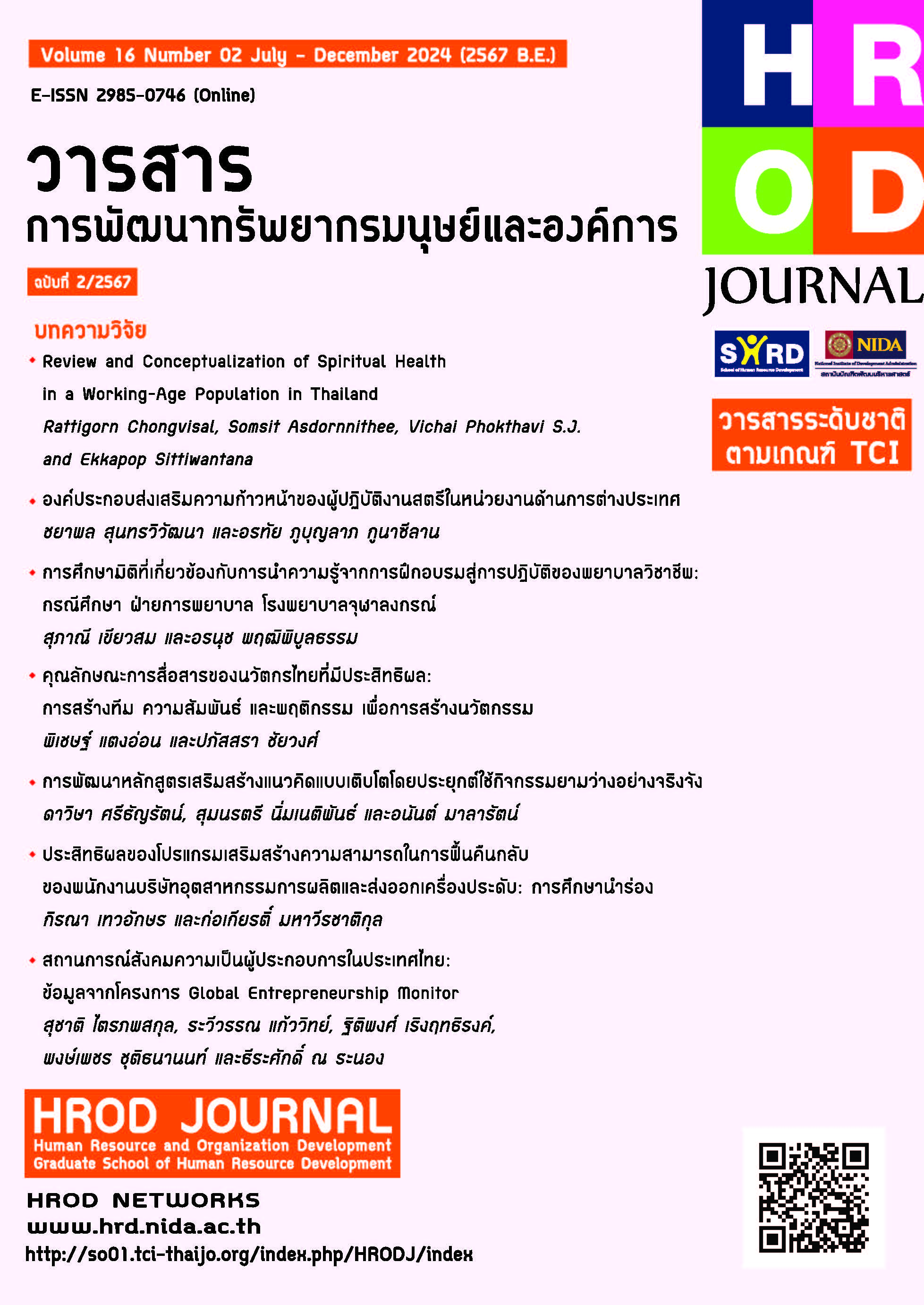Review and Conceptualization of Spiritual Health in a Working-Age Population in Thailand
Main Article Content
Abstract
In this study, the authors investigated the concepts and components of spiritual health in a Thai working-age population using documentary research and phenomenological research as methodologies. They were based on a qualitative sociological approach, while the tools used were primarily content analysis and in-depth interviews. The 20 informants were purposively selected for their long-term experiences and embodiment of spiritual health, whether as experts or lay practitioners. Documentary sources were searched, scrutinized, and analyzed for keywords and structures of meaning to assess the findings. The results demonstrated a conceptual framework for spiritual health in a Thai working-age population, assessed as definitions, indicators, and supporting factors. By definition, spiritual health means seeing and understanding the truth as it is (insight) and feeling connected to something greater (connectedness). The indicators of spiritual health are behavioral and mental; supporting factors include inner actions (practices of mind) and outer actions (practices in action). The conceptual frameworks summarized from in-depth interviews and documents show a fair agreement with each other in terms of essence and meanings. The findings become good contributions to the development of a workable measuring tool, designing sets of experiential activity in psycho-healing, and the development of policy-making regarding spiritual health promotion in various social sectors.
Article Details

This work is licensed under a Creative Commons Attribution-NonCommercial-NoDerivatives 4.0 International License.
1) The content of article in HROD journal is the author’s wholly responsibility to research, analyze, summarize, compile, and reference data. The editorial department will not be responsible in anyway.
2) The submitted articles in HROD journal must be unpublished before and must not be currently under consideration for publication elsewhere. If it is detected for its repetition, the author must be responsible for infringement of copyright.
3) Authors will be asked to transfer copyright of the article to the Publisher. The article is prohibited to reproduce all or part of the text, unless allowed.
References
Chongvisal, R. (2021). Organizational psychology (5th ed). Chulalongkorn University Press.
Chongvisal, R., Akakulanan, S., Phumchan, P., Kittipichai, W., Wongpinpech, P., & Suproekchaisakul, N. (2010). The study and construction of instrument and indicators of spiritual health for development. Sodsri Saritwong Foundation.
Chuengsatiensub, K. (2006). Review of spirituality concepts: A philosophical and conceptual analysis. Sodsri Saritwong Foundation.
Chuengsatiensub, K., & Anupongpat, N. (2017). Spiritual health: Spirituality, religion, and humanity. National Health Commission Office.
Dhar, N., Chaturvedi, S. K., & Nandan, D. (2011). Spiritual health scale 2011: Defining and measuring 4th dimension of health. Indian Journal of Community Medicine, 36(4), 275-282. https://doi.org/10.4103/0970-0218.91329
Fisher, J. (2010). Development and application of a Spiritual Well-Being Questionnaire called SHALOM. Religions, 1, 105–121. https://doi.org/10.3390/rel1010105
Mitroff, I. I., & Denton, E. A. (1999). A spiritual audit of corporate America: A hard look at spirituality, religion, and values in the workplace. Jossey-Bass.
Plitpolkarnpim, P. (2009). Nineteen questions to develop spirituality. Sodsri Saritwong Foundation.
Praiyam, A., Tadsri, S., & Sunthornampai, G. (2009). A synthesis of knowledge in
a development of wisdom (spirituality) from narratives regarding success of health care providers and recipients. Sodsri Saritwong Foundation.
Seidl, L. G. (1993). The value of spiritual health. Health progress (Saint Louis, Mo.), 74(7), 48-50.
Wasi, P. (2004). A new approach in public administration. Chulalongkorn University Press.
Wasi, P. (2009). Forming human values and strengthening community well-being. (2nd ed.). QTP.


